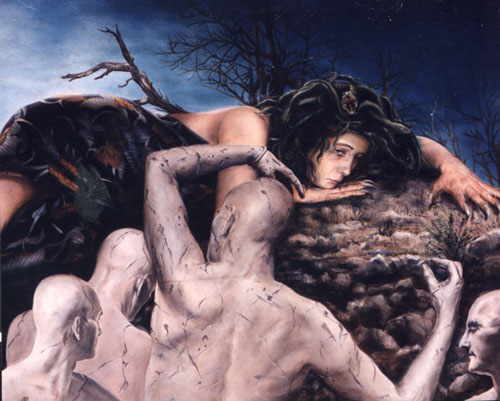Is she representative of madness? Or of a kind of truth that can only be spoken by madness?
I cannot help remembering a remark of De Casseres. It was over the wine in Mouquin's. Said he: "The profoundest instinct in man is to war against the truth; that is, against the Real. He shuns facts from his infancy. His life is a perpetual evasion. Miracle, chimera and to-morrow keep him alive. He lives on fiction and myth. It is the Lie that makes him free. Animals alone are given the privilege of lifting the veil of Isis; men dare not. The animal, awake, has no fictional escape from the Real because he has no imagination. Man, awake, is compelled to seek a perpetual escape into Hope, Belief, Fable, Art, God, Socialism, Immortality, Alcohol, Love. From Medusa-Truth he makes an appeal to Maya-Lie."~ Jack London, The Mutiny of the Elsinore
When Perseus beheaded Medusa, Pegasus emerged from her decapitated body and he stamped his hooves to create the Hippocrene. The waters of the Hippocrene are said to induce poetic inspiration. If we read this as allegory, then poetic inspiration springs forth from madness.
According to Ngũgĩ wa Thiong'o, in Penpoints, Gunpoints, and Dreams, madness is when the "dreaming process" becomes "uncontrollable" and he distinguishes this kind of dreaming from the production of art, but also suggests that "art is the keeper of our dreams."
But do uncontrollable dreams turn us to stone?

No comments:
Post a Comment